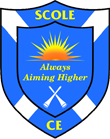Welcome to
Scole C of E Primary School

At Scole CE Primary Academy, we are proud to be a small community focused school. Our core values of Positivity, Courage and Respect are the foundation to
- Help us learn to take care of ourselves and each other
- Have pride in ourselves, the school and the community
- Develop a sense of spirituality under God's care
- Have self-discipline and take responsibility for our own actions
- Be independent and prepared for the future
In order to be able to achieve this, we are committed to working together with all members of our learning community; pupils, parents, staff, governors and our partner schools in Diss. Together we feel we can make a huge difference and we strive to be creative and ensure children have learning experiences that will support them to flourish through the exciting opportunities available only through small school working.
I hope that you find our website interesting and informative; if you would like to find out more, please don’t hesitate to contact us.
Best wishes
Mrs J Cerullo, Executive Headteacher

 Scole C of E Primary Academy
Scole C of E Primary Academy